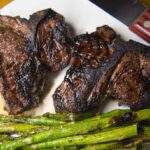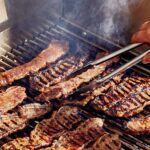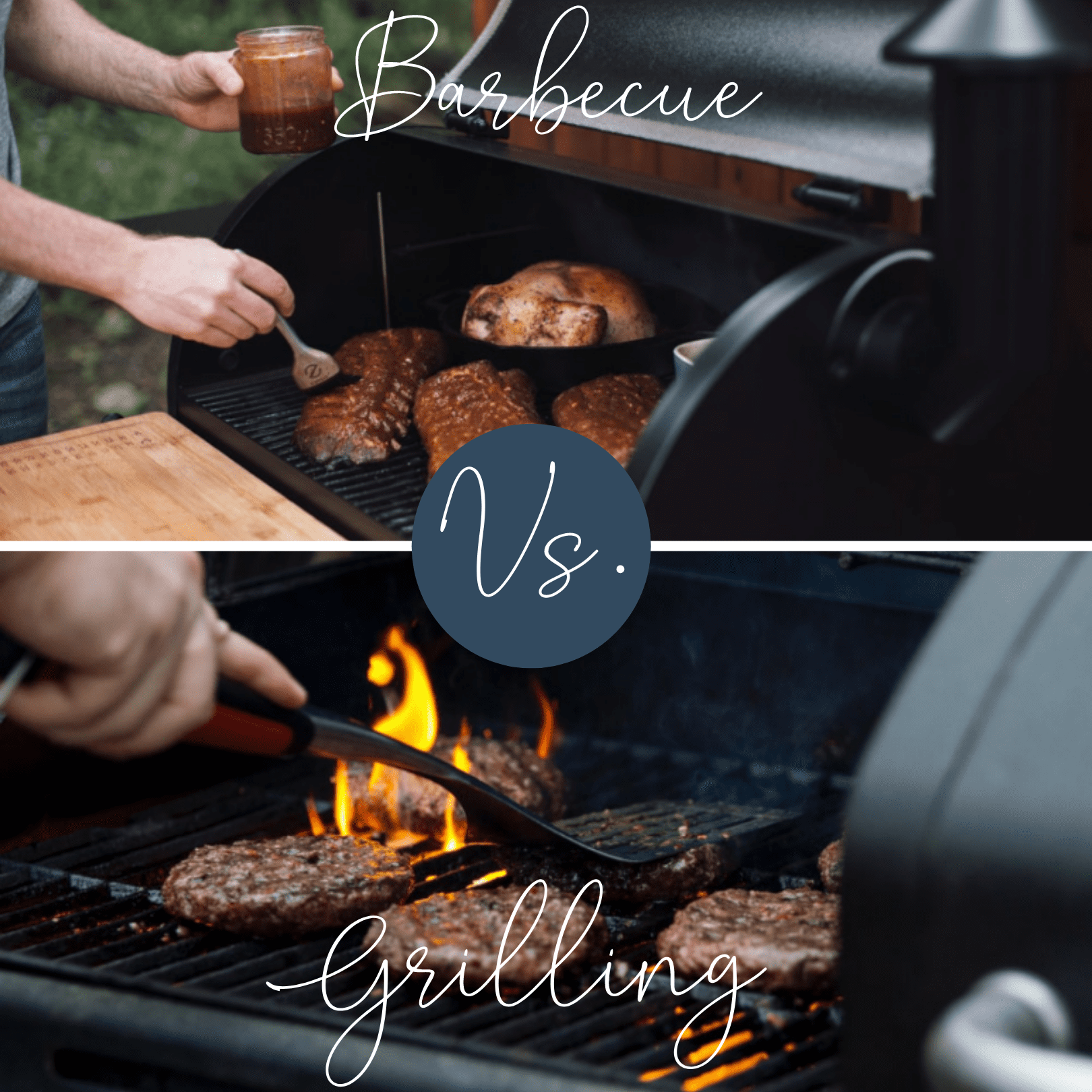
Are you a barbecue enthusiast? If so, you’ve probably been debating the age-old question: Is grilling better than BBQ? This article aims to provide some insights into this culinary conundrum.
So, if you’ve ever wondered about the differences between grilling and BBQ and which one comes out on top, get ready to sizzle with excitement, and let’s explore the world of outdoor cooking together!
The Difference Between Grilling and BBQ
Grilling and BBQ are both popular cooking methods that are often used interchangeably. Still, they offer distinct differences in terms of cooking method, time commitment, flavor profile, versatility, and equipment needed. Understanding these differences can help you decide which method is best suited to your culinary preferences and needs. So let’s dive in and explore the unique characteristics of grilling and BBQ.
Cooking Method
Grilling involves cooking food directly over high heat, usually on a grill grate or an open flame. The food is placed on the grates, and the heat quickly cooks the food’s exterior, resulting in beautiful sear marks and a deliciously charred flavor.
On Conversely, BBQ, or barbecuing, is a slow cooking method that uses low, indirect heat. The food is placed away from the direct heat source, allowing it to cook slowly and absorb the smoky flavors from the wood chips or pellets used for smoking.
Time Commitment
Regarding time commitment, grilling is the winner in terms of speed. Grilling typically takes a relatively short amount of time, which makes it ideal for weeknight dinners or when you have limited time to prepare a meal. On the other hand, BBQ requires a longer cooking time.
The low and slow cooking method of BBQ demands patience, as it can take several hours, or even overnight, to achieve tender and juicy meats. BBQ is typically reserved for weekend gatherings or special occasions when you have the luxury of time.
Flavor Profile
One of the key differences between grilling and BBQ is the flavor profile they impart to the food. Grilling, with its high heat, gives food a quick sear, retaining its natural flavors. The charred exterior enhances the taste, while the interior remains juicy and tender. BBQ, on the other hand, creates an intense and smoky flavor that permeates the food. The slow cooking process allows the meat to absorb the flavors of the wood smoke, resulting in a distinct taste that is loved by barbecue enthusiasts around the world.
Versatility
When it comes to versatility, grilling takes the crown. Grilling allows you to cook various foods, including vegetables, seafood, and even fruits. The direct heat and shorter cooking time make it suitable for various cuts of meat and quick-cooking ingredients.
BBQ, while typically associated with meat, also offers some versatility. It can be used to cook large cuts of meat, such as brisket or whole chicken, as well as ribs and pulled pork, which benefit from the slow cooking process and flavor infusion.
Equipment Needed
Both grilling and BBQ require specific equipment, although the level of complexity and investment varies. For grilling, a traditional gas or charcoal grill is commonly used. These grills are readily available, easy to use, and come in various sizes to fit your needs.
BBQ, on the other hand, often requires a specialized smoker or a charcoal grill with added features for indirect cooking and smoking. Additionally, BBQ enthusiasts may opt for wood chips or pellets to add smoke flavor to their meats. While both methods require some equipment, grilling is generally more accessible to most home cooks.
Advantages of Grilling
Grilling offers several advantages that make it a favorite cooking method for many. Let’s explore some of its key benefits.
Quick and Convenient
Grilling is a quick and convenient cooking method, making it perfect for busy weeknight dinners or when you’re short on time. With direct heat, you can achieve a nicely cooked meal in a matter of minutes. It’s as simple as firing up the grill, placing the food on the grates, and keeping an eye on it as it cooks.
Retains Natural Flavors
Grilling allows the natural flavors of the food to shine through. The high heat helps lock in the juices, producing tender and juicy meats. Whether you’re grilling a steak, a piece of chicken, or vegetables, the flavors are preserved, giving you a delicious and authentic taste.
Healthier Cooking Method
Compared to other cooking methods like frying or deep-frying, grilling is considered a healthier option. When grilling, excess fat drips off the food, resulting in a lower fat content. Additionally, grilling requires little to no added oil or fat, making it a great choice for those looking to reduce their calorie intake or follow a healthier lifestyle.
Wide Range of Options
With grilling, you have a wide range of options regarding the types of food you can cook. The possibilities are endless, from juicy steaks to flavorful burgers, from fresh vegetables to succulent seafood. Grilling allows you to experiment with various ingredients and flavors, making it a versatile cooking method that can cater to different tastes and dietary preferences.
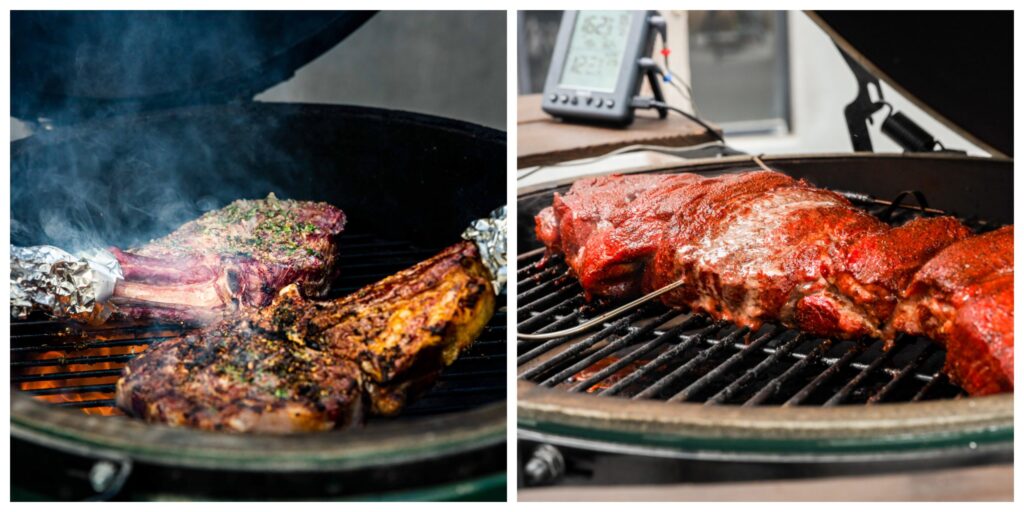
This image is property of blog.thermoworks.com.
Advantages of BBQ
While grilling has its merits, BBQ offers a unique set of advantages that make it a beloved cooking method among barbecue enthusiasts. Let’s take a look at some of its benefits.
Low and Slow Cooking
BBQ is all about low and slow cooking. The use of indirect heat and the long cooking time allows the meat to break down slowly, resulting in tender and flavorful dishes. The slow cooking process allows for the development of complex flavors and a melt-in-your-mouth texture that is hard to achieve with other cooking methods.
Intense Flavor
One of the biggest draws of BBQ is the intense flavor it imparts to the food. The combination of low heat and smoke from wood chips or pellets creates a unique taste profile that is rich, deep, and smoky. This flavor is highly sought after and often associated with traditional barbecue dishes.
Tender and Juicy Meats
The low and slow cooking method of BBQ ensures that the meats come out tender, juicy, and full of flavor. The slow process allows the connective tissues in the meat to break down, resulting in incredibly tender meat, with a desirable moistness that is hard to achieve through other cooking methods.
Variety of Regional Styles
One of the joys of BBQ is the variety of regional styles it encompasses. From the tangy and tomato-based Kansas City style to the vinegar-based Carolina style, each region has its own unique take on BBQ. Exploring these different styles can be a fascinating journey that adds depth and excitement to your culinary repertoire.
Social Experience
BBQ is not just a cooking method; it’s a social experience. The slow cooking process encourages gathering and spending quality time with family and friends. Whether it’s a backyard barbecue or a festive occasion, BBQ brings people together, creating lasting memories and fostering community.
When to Choose Grilling?
While both grilling and BBQ have their merits, there are specific situations where grilling is the preferred method. Let’s take a look at when grilling is the way to go.
Weeknight Dinners
When you have limited time, grilling is the perfect solution for a quick and satisfying meal. With its short cooking time, you can have dinner on the table quickly. Whether you’re cooking a steak, chicken breasts, or a selection of vegetables, grilling allows you to whip up a delicious meal without spending hours in the kitchen.
Smaller Cuts of Meat
Grilling is ideal for smaller cuts of meat that cook quickly over high heat. Steaks, burgers, and kebabs are all great candidates for grilling. The direct heat helps create a beautiful sear while preserving the natural flavors and juiciness of the meat.
Vegetables and Seafood
Grilling is not limited to just meat. It’s a fantastic method for cooking vegetables and seafood as well. Grilling brings out the natural sweetness of vegetables and adds a smoky char that enhances their flavors. Seafood, such as shrimp, fish fillets, and even whole fish, can be grilled to perfection, creating a delightful taste experience.
Time Constraints
When time is of the essence, grilling is the way to go. Whether you’re a busy professional or a parent juggling multiple responsibilities, grilling allows you to prepare a delicious meal in a fraction of the time it takes for other cooking methods. It’s a convenient option that doesn’t compromise on taste.
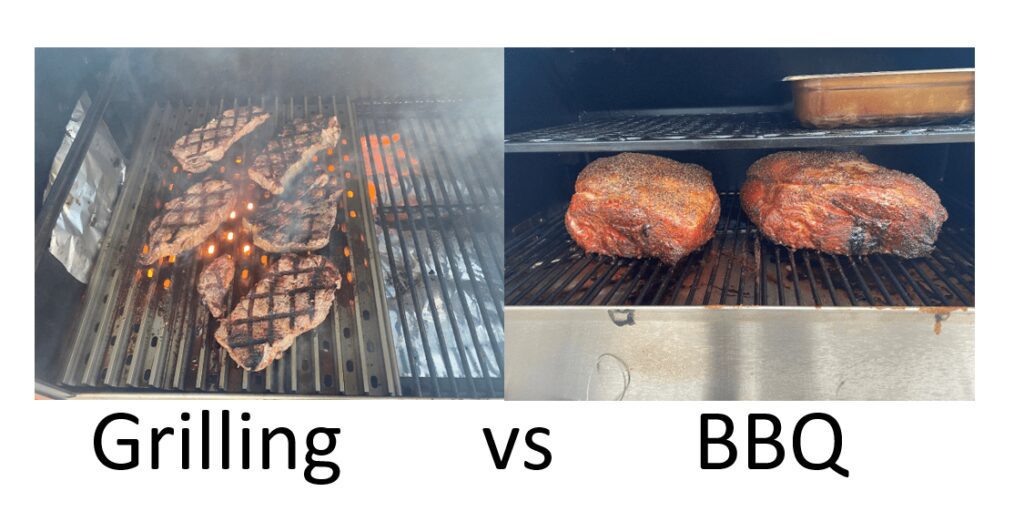
This image is property of i0.wp.com.
When to Choose BBQ
While grilling has its advantages, there are occasions when BBQ is the preferred method. Let’s explore when BBQ is the way to go.
Weekend Gatherings or Special Occasions
BBQ is often associated with weekend gatherings and special occasions. It’s the cooking method that requires time, patience, and a relaxed atmosphere. Whether hosting a backyard barbecue, celebrating a milestone, or simply enjoying a leisurely weekend, BBQ adds a special touch to the occasion, bringing people together and creating memorable experiences.
Large Cuts of Meat
If you have a large cut of meat, such as a brisket or a whole chicken, BBQ is the perfect method to ensure it cooks evenly, remains tender, and develops complex flavors. The long cooking time and low heat allow the meat to slowly break down, resulting in a tender and juicy finished product that will impress your guests.
Ribs and Pulled Pork
When it comes to ribs and pulled pork, BBQ is the go-to method. Ribs benefit from the slow cooking process, which tenderizes the meat and infuses it with smoky flavors. Pulled pork, with its long cooking time, allows the meat to become incredibly tender, making it easy to shred into succulent pieces.
Leisurely Cooking Process
BBQ is not a cooking method for those in a hurry. It’s a leisurely process that demands time, attention, and patience. If you enjoy the art of slow cooking, tending to a fire, and savoring the aroma of wood smoke, then BBQ is the perfect choice. It’s a method that allows you to slow down, relax, and enjoy the journey as much as the result.
Tips for Grilling Success
Grilling, like any other cooking method, requires some tips and tricks to ensure success. Here are some tips that will help you become a grilling pro.
Preheat the Grill
Before placing the food on the grill, preheat it properly. This ensures that the grates are hot, which prevents sticking and helps create those coveted grill marks. A preheated grill also ensures the food cooks evenly and reduces the risk of undercooked or overcooked sections.
Oil the Grates
To further prevent sticking, it’s important to oil the grates before placing the food on them. Using a high-heat oil like canola or vegetable oil, lightly brush the grates to create a nonstick surface. This is especially important when grilling lean meat or delicate foods like fish or vegetables.
Season the Food
Seasoning your food before grilling enhances its flavor and adds depth to the final result. Whether it’s a simple salt and pepper rub or a more complex marinade, or a dry rub, take the time to season your meat, vegetables, or seafood before it hits the grill. This will ensure a delicious taste that will leave your guests wanting more.
Use Direct and Indirect Heat
Grilling is not just about high heat. It’s important to understand when to use direct heat and when to use indirect heat. Direct heat is ideal for cooking thinner cuts of meat or foods that require a quick sear.
Indirect heat, on the other hand, is best for larger cuts of meat or foods that require longer cooking times. By understanding and utilizing both heat methods, you can achieve perfectly cooked food.
Properly Monitor Cooking Times and Temperatures
To avoid undercooked or overcooked food, it’s crucial to monitor cooking times and temperatures. Invest in a good meat thermometer to ensure that your meat reaches the desired internal temperature. This will not only ensure food safety but also guarantee optimal taste and texture.
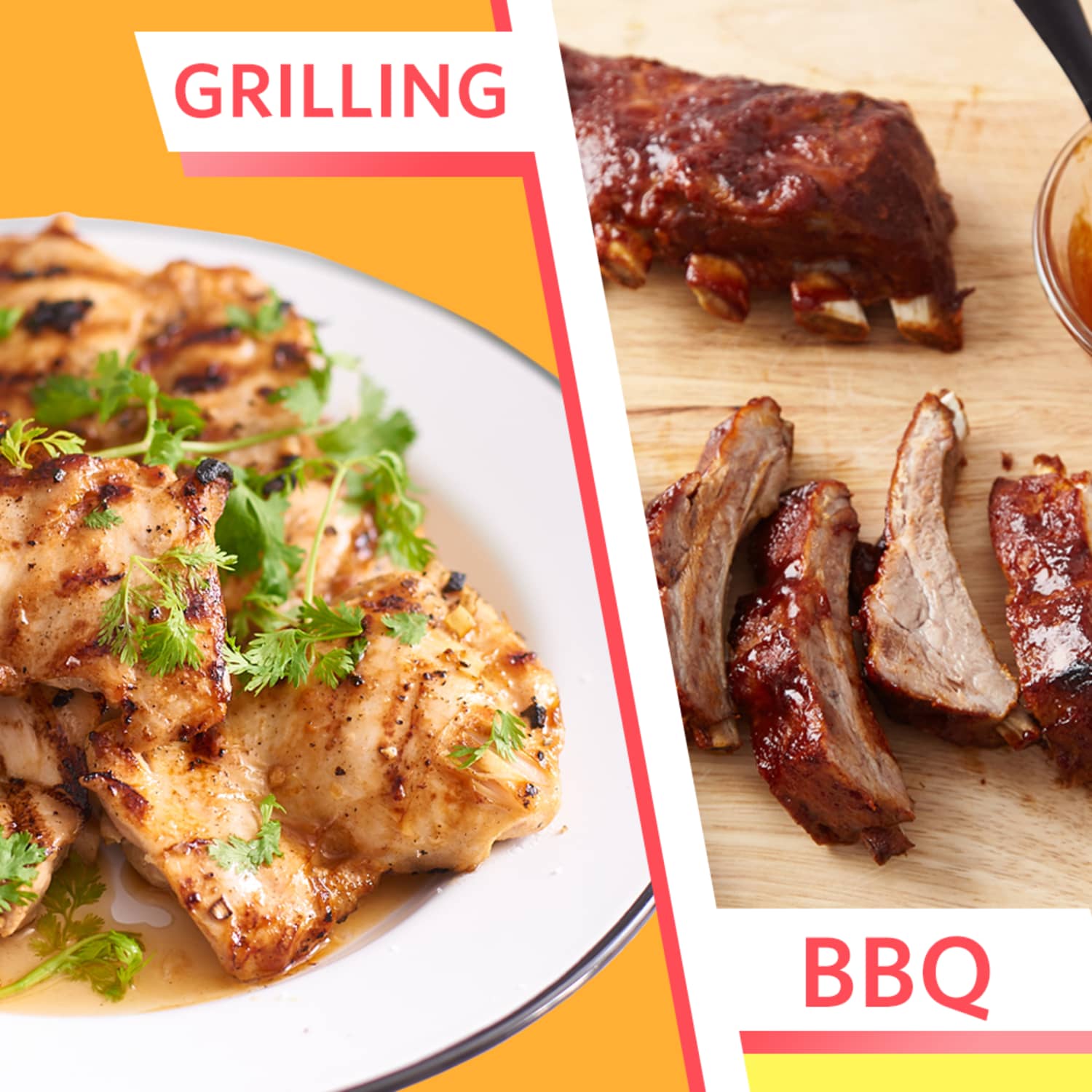
This image is property of cdn.apartmenttherapy.info.
Tips for BBQ Success
BBQ is a culinary art that requires finesse and attention to detail. Here are some tips that will help you achieve BBQ greatness.
Select the Right Meat
Choosing the right cut of meat is crucial for a successful BBQ. Opt for cuts known for their tenderness and ability to withstand the long cooking process. Brisket, pork shoulder, ribs, and whole chickens are excellent choices for BBQ. Look for marbling in the meat, as this will contribute to its juiciness and flavor.
Apply a Dry Rub or Marinade
To add flavor and enhance the taste of your BBQ, apply a dry rub or marinade to the meat before cooking. Dry rubs are a mixture of spices and herbs that are rubbed onto the surface of the meat, while marinades are liquid-based mixtures that the meat is soaked in. Both methods infuse the meat with flavor, creating a delicious taste experience.
Maintain Consistent Temperature
Consistency is key when it comes to BBQ. Maintaining a consistent temperature throughout the cooking process is essential for achieving tender and delicious meat. Invest in a reliable thermometer to monitor the temperature inside the smoker or grill, and make adjustments as needed to ensure a steady and even heat.
Use Wood Chips or Pellets for Smoke
Smoke is an integral part of BBQ, adding depth and complexity to the flavor of the meat. Experiment with different wood chips or pellets to impart unique smoky flavors. Hickory, mesquite, and applewood are popular choices that pair well with various meats.
Master the Art of Low and Slow Cooking
The essence of BBQ lies in the low and slow cooking process. Patience is key, as it can take several hours, or even overnight, to achieve a perfectly cooked barbecue. Stay vigilant and maintain a steady temperature, periodically checking the meat for tenderness and doneness. Embrace the slow cooking process and savor the journey as you create a mouthwatering barbecue.
Common Grilling Mistakes
Even the most seasoned grill masters can make mistakes. Here are some common grilling mistakes to avoid.
Cooking on a Dirty Grill
A clean grill is crucial for a successful grilling experience. Make sure to clean the grill grates before each use to prevent food from sticking and to eliminate any lingering flavors from the previous cookout. This will ensure that your food cooks evenly and tastes its best.
Flare-ups Caused by Excess Fat
Excess fat dripping onto the flames can cause flare-ups, resulting in charred or burned food. Trim excess fat from your meat before grilling to minimize the risk of flare-ups. Additionally, avoid placing fatty meats directly over high flames to reduce the chances of excessive charring.
Overcooking or Burning Food
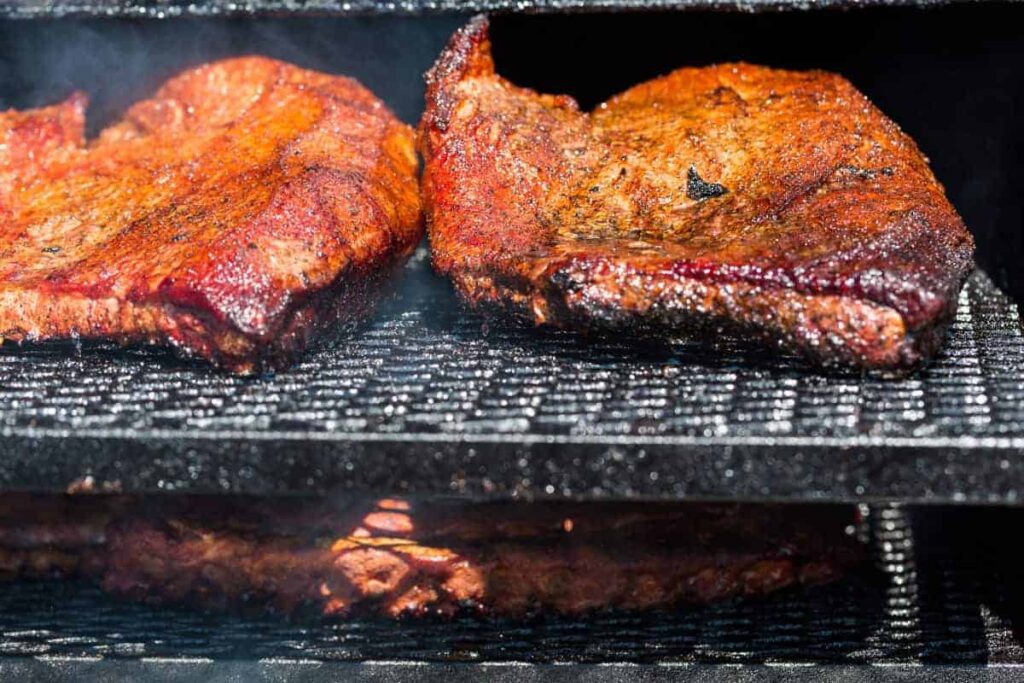
This image is property of www.foodfirefriends.com.
Keeping a close eye on your food while grilling is crucial to prevent overcooking or burning. The high heat of the grill can cause food to cook quickly, so be sure to monitor cooking times and internal temperatures. Use a meat thermometer to gauge the doneness of the meat and remove it from the grill at the right moment.
Failure to Rest the Meat
Resting the meat after grilling allows the juices to redistribute, resulting in a more tender and flavorful final product. Avoid the temptation to cut into the meat immediately after removing it from the grill. Instead, let it rest for a few minutes to ensure that it retains its juiciness and optimal taste.
Common BBQ Mistakes
BBQ is a delicate process that requires attention to detail. Here are some common BBQ mistakes to avoid.
Not Allowing Enough Cooking Time
BBQ is a patient chef’s game. One of the most common mistakes is not allowing enough cooking time. Low and slow cooking requires patience and time for the meat to reach the desired tenderness. Rushing the process can result in tough and chewy meat that is far from the melt-in-your-mouth goodness of true barbecue.
Inconsistent Temperature Control
Maintaining consistent temperature control throughout cooking is crucial for achieving BBQ perfection. Fluctuating temperatures can result in unevenly cooked meat and a subpar result. Invest in a reliable thermometer and adjust the airflow and fuel as needed to maintain a steady and even temperature inside the smoker or grill.
Neglecting the Importance of Smoke
Smoke is one of the defining characteristics of BBQ. Neglecting the importance of smoke can result in lackluster flavor. Ensure that you have the appropriate amount of wood chips or pellets to generate smoke during the cooking process. Experiment with different types of wood to find the flavors that best enhance your desired taste.
Rushing the Resting Phase
Similar to grilling, resting the meat after BBQ is crucial for achieving optimal taste and tenderness. Rushing the resting phase can result in meat that is dry and lacks the juiciness that makes BBQ so special. Give your meat ample time to rest, covered with foil, to allow the juices to redistribute and create a flavorful and moist end result.
Conclusion
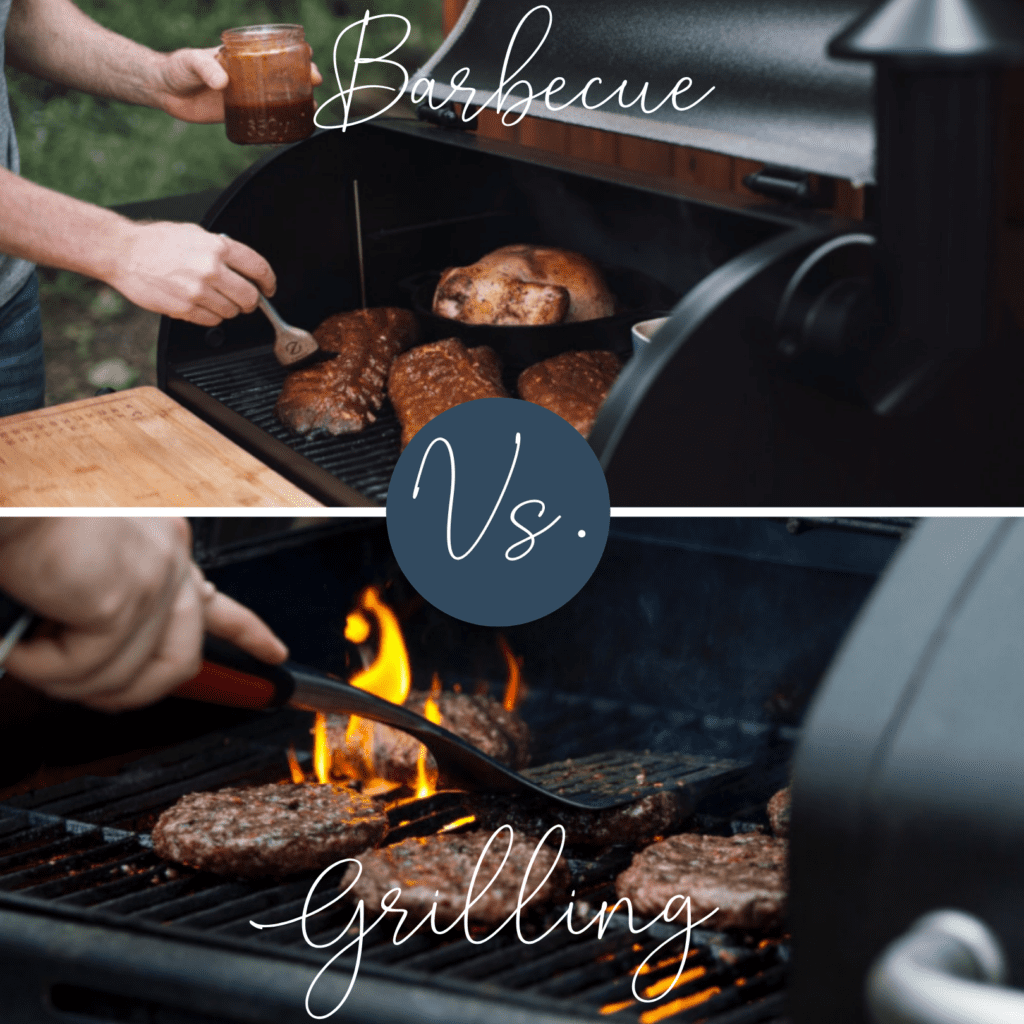
This image is property of smokeynorthbbq.com.
Grilling and BBQ each offer their own unique advantages and characteristics. Grilling excels in speed and convenience, allowing you to have a delicious meal on the table in no time. It retains the natural flavors of the food and offers a wide range of options.
On the other hand, BBQ shines with its low and slow cooking process, creating intense flavors, tender meats, and a social experience. It is perfect for weekend gatherings or special occasions, offering a variety of regional styles. Knowing when to choose grilling or BBQ, as well as following the tips and avoiding common mistakes, will help you become a master of the grill and the pit.
So, embrace the art of outdoor cooking, gather your friends and family, and enjoy the delicious results of your grilling and BBQ adventures. Happy cooking!
